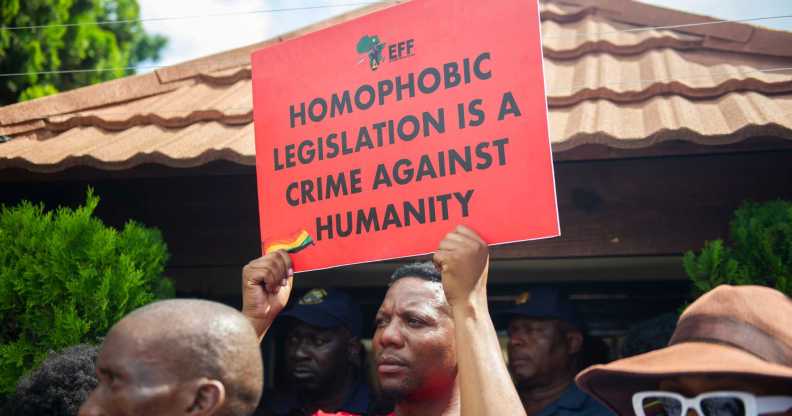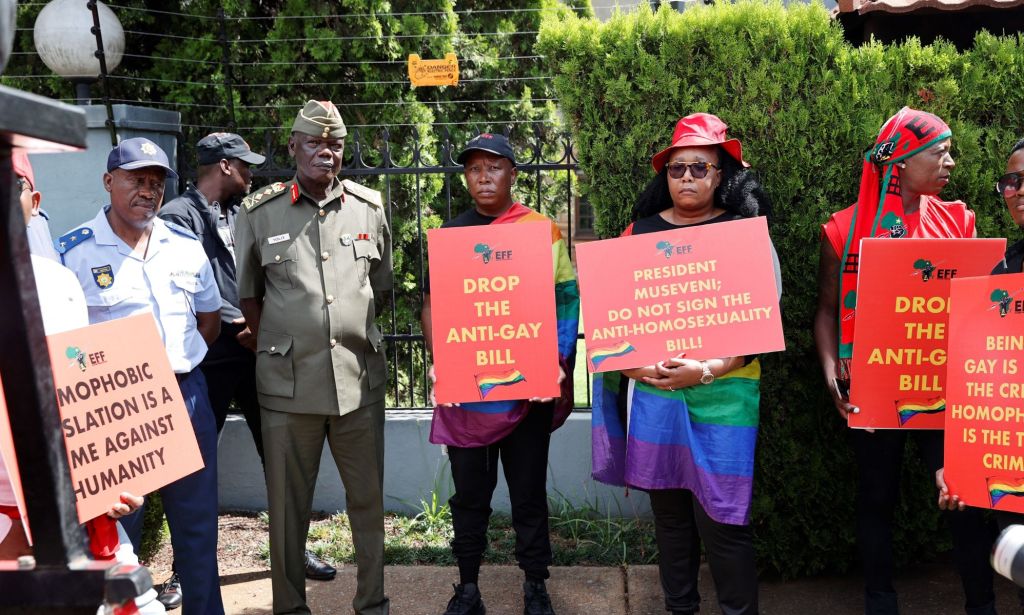Uganda condemned by Joe Biden, UK government and world leaders over lethal anti-gay law

The World Bank has cut off new lending to Uganda after it signed into law the Anti-Homosexuality Act 2023. (Alet Pretorius/Gallo Images via Getty Images)
Uganda has been condemned by western governments, activists and LGBTQ+ groups after president Yoweri Museveni signed the lethal Anti-Homosexuality Act into law.
The nation’s anti-LGBTQ+ legislation is some of harshest in the world and sees the death penalty imposed for “aggravated homosexuality” and possible life imprisonment for taking part in gay sex.
The new law defines “aggravated homosexuality” as same-sex sexual activity involving those with HIV or who are disabled, as well as non-consensual criminal sex acts towards children and those who are drugged against their will.
Uganda’s parliament approved an earlier version of the bill in March – to rapturous applause from cross-party lawmakers – that contained provisions seeking to make it illegal to merely identify as LGBTQ+.
This clause was later removed by lawmakers and the legislation was passed for a second time. Other than that, the bill remains materially the same.
Western governments were quick to admonish the East African country, with the threat of sanctions hanging heavy.
US president Joe Biden called the bill shameful and a “tragic violation of universal human rights”, labelling it as part of a growing trend of “human rights abuses and corruption in Uganda”.
The president said: “Since the Anti-Homosexuality Act was introduced, reports of violence and discrimination targeting Ugandans who are, or are perceived to be, LGBTQI+ are on the rise.
“Innocent Ugandans now fear going to hospitals, clinics or other establishments to receive life-saving medical care lest they be targeted by hateful reprisals.
“Some have been evicted from their homes or fired from their jobs. And the prospect of graver threats – including lengthy prison sentences, violence [and] abuse – threatens any number of Ugandans who want nothing more than to live their lives in safety and freedom.”
He went on to say that the dangers posed by this “democratic backsliding” are a threat to everyone in Uganda, including US government staff, employees of US partner agencies and tourists.
The White House will evaluate the law and the United States’ engagement with the East African nation, with the potential to introduce sanctions and restrict entry to the US for Ugandan lawmakers involved in human rights abuses.
In Britain, Conservative MP Andrew Mitchell, the minister for development and Africa, said Westminster is “appalled” by the new law.
Mitchell, who represents Sutton Coldfield, in the West Midlands, added: “This legislation undermines the protections and freedoms of all Ugandans enshrined in the Ugandan constitution.
“It will increase the risk of violence, discrimination and persecution, will set back the fight against HIV/Aids, and will damage Uganda’s international reputation.”
The UK government is opposed to the death penalty in all forms, he stressed, and will continue to stand up for the rights and freedoms of Ugandans.
‘How many will die?’
A spokesperson for the United Nations Human Rights Commission said: “We are appalled that the draconian and discriminatory anti-gay bill is now law. It is a recipe for systematic violations of the rights of LGBT people and the wider population.
“It conflicts with the constitution and international treaties, and requires urgent judicial review.”
In a statement, the Equal Rights Coalition – which includes countries such as France, Sweden, and Canada alongside the US and UK – said it has “grave concerns” over the legislation and the “uptick” in violence against LGBTQ+ Ugandans.
The coalition said: “There is no excuse for violence and discrimination, under any circumstance, against any group. That includes violence on the basis of actual or perceived sexual orientation, gender identity or gender expression.
“The Anti-Homosexuality Act 2023 infringes on the human rights of all Ugandans, while gravely undermining the human rights of LGBTI persons in particular.
“More broadly, it contributes to a climate of fear and persecution which will also negatively impact on trade, public health, investment, tourism and development.
“It also risks undoing the important progress that Uganda has made on global challenges, such as the fight against HIV/AIDS.”
Meanwhile, Arthur Kayima, a queer Ugandan human rights activist, branded the legislation vile and deadly.
“Rather than focusing on the real issues Uganda is facing – poverty, poor infrastructure, the economy, domestic violence – Museveni [causes] distraction by attacking our fundamental right to exist,” he said.
“I am afraid for my community. How many of us will be jailed, or beaten, or further chased into the shadows of society as a result of this legislation? How many will die?
“All those who believe in our rights must fight this legislation and the forces behind it by all means necessary,” he urged.
Fellow LGBTQ+ Ugandan activist, Kasha Nabagesera, who is now based in the United States, said on Twitter that she was heartbroken by the passage of the bill but “shall fight until justice is served”.

Mike Podmore, the director of UK-based HIV, health and rights network Stopaids, said the bill is a “direct assault on human rights” as well as a “public-health threat that will decimate the HIV response”.
He continued: “We must do everything to persuade Uganda against this regressive step that could trigger a domino effect among other countries in the region, to further backslide on LGBTQI+ rights, including Kenya, Ghana and Burundi.
“Governments worldwide must immediately act to assert the rights of gay people and ensure the safety of LGBTQI+ Ugandans, by ensuring frontline services are supported and safe asylum is given wherever needed.”
Stonewall UK chief executive Nancy Kelley wrote on Twitter: “This makes me heart-sick, for the world we are living in and, most of all, for LGBTQ+ Ugandans and their loved ones.”
How did this story make you feel?

